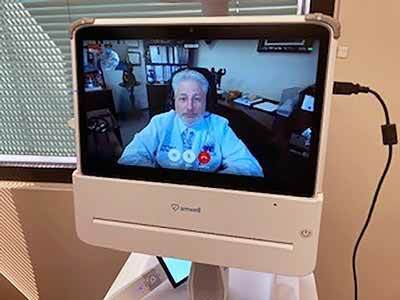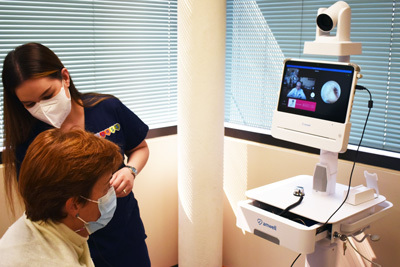Los Angeles Jewish Home Receives Major Funding to Bring State-of-the-Art Technology to the Delivery of Care


Los Angeles Jewish Home Receives Major Funding to Bring State-of-the-Art Technology to the Delivery of Care

The Jewish Home is a recognized leader in providing quality care to thousands of seniors across Los Angeles each year. This fall, the Home is once again blazing a trail, having secured not one, but two significant financial awards in the form of technology grants to increase seniors' access to the Home's vital programs and services.
In partnership with the California Emerging Technology Fund (CETF), a statewide nonprofit foundation working to close the digital divide in California, the Jewish Home received more than $860,000 from the Federal Communications Commission (FCC) for the groundbreaking COVID-19 Telehealth Program. Together, the two agencies are leading a collaboration that includes 12 other prominent California healthcare entities dedicated to advancing telehealth during the pandemic. The Jewish Home and other organizations in the group will use the award to purchase telehealth carts, Wi-Fi extenders, and tablets, helping to make telehealth services available to underserved and under-connected communities across the state.
"COVID-19 highlighted the healthcare inequality that exists in our country. This horrific virus disproportionately affected the poor, the undocumented, people of color, indigenous populations, and seniors. To limit the possibility of viral transmission, many clinicians and care facilities—including the Jewish Home— accelerated our use of telehealth, but too many people lacked the necessary resources to access it," says Noah Marco, MD, the Home's chief medical officer. "With this partnership, we are proud to be at the vanguard of efforts to reduce healthcare disparity and improve clinical outcomes for seniors and others."
Just 62 healthcare providers nationwide were awarded the coveted FCC funds, and the Jewish Home-CETF partnership was the only California group that was approved. It was also among the highest ranked applicants in the latest round.

In addition, the Home was recently honored with a prestigious Reimagine Grant from the Jewish Community Foundation of Los Angeles. The award—a portion of $3.7 million the foundation granted to 45 local Jewish nonprofits and synagogues—will also reinforce the Jewish Home's commitment to expanding telehealth's availability. Funds from the grant will allow the Home to hire a nurse informaticist/telehealth manager to lead the programmatic and clinical aspects of bringing telemedicine to our residents. This is a critical link in the successful provision of the Jewish Home's state-of-the art care.
"The Jewish Home has been caring for seniors for more than a century, and we remain a national leader by staying at the forefront of innovation," says Dale Surowtiz, the Home's chief executive officer and president. "We are deeply appreciative of the Jewish Community Foundation's generous grant, which will enable us to continue driving that innovation forward into the future."